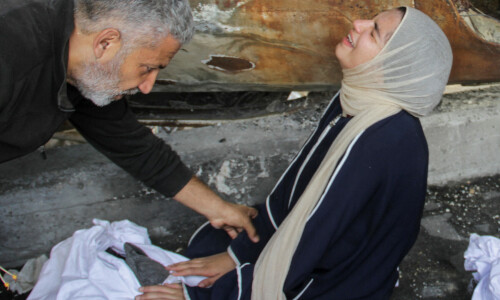KARACHI: Sindh Chief Minister Syed Murad Ali Shah has imposed ban on cultivation of paddy on left bank of the Indus River to check fast-spreading waterlogging in large swathes of land adjacent to rice fields.
He took the decision at a joint meeting of ministers of agriculture and irrigation, officers concerned and divisional commissioners at CM House here on Monday and said that paddy was a semi-aquatic (high-delta) crop that required plenty of water. “It requires 16.50mm water per day and a total of 2,500-3,000 litres of water to produce one kilogram of rice,” he said.
Hence, he said, heavy and clay soils that could hold water for a long time were suitable for paddy cultivation. Other crops could not survive in the surrounding of paddy fields because of destruction of their roots due to presence of more than required water.
Besides, he said, water standing in farmland continuously for long periods of time had caused waterlogging. “Stagnant water affects capillary tubes of soil and increases capillary movement of water up to far-flung areas,” he said.
Minister for Irrigation Sohail Anwar Siyal said that since paddy was a high-delta crop, it used up share of irrigation water of other crops as well. “It ultimately leads to drought-like conditions in tail-end areas of canals,” he said.
Minister for Agriculture Ismail Rahu said that having good structure and texture, loam and sandy loam soils on the left bank were suitable for crops other than paddy. Due to cultivation of paddy on the left bank, the area under cotton and sugar cane cultivation was decreasing year after year.
Keeping in view all these factors, mainly waterlogging and damage to other crops, the chief minister had decided to impose a complete ban on the cultivation of paddy on the left bank of the river, he said.
He directed Chief Secretary Mumtaz Shah to make it binding on revenue authorities to keep vigilant eye on rice cultivation on the left bank and ensure destruction of existing nurseries forthwith.
The ban covered the districts of Ghotki, Sukkur, Khairpur, Naushahro Feroze, Shaheed Benazirabad, Matiari, Sanghar, Mirpurkhas, Umerkot and Hyderabad.
The agriculture department suggested to farmers on the left bank to grow low-delta crops such as mung, beans, watermelon, melon, cucurbits and other vegetables.
Policy decisions
The chief minister took a policy decision and directed the chief secretary to impose ban on cultivation of paddy crop on the left bank of Indus under Section 144. The paddy nurseries would be razed in June-July and farmers would be sensitised to avoid cultivation of paddy.
The chief minister directed district administrations to ensure implementation of the ban with the assistance of police.
The meeting was also attended by secretary of agriculture Raheem Soomro, secretary of irrigation Saleem Khuhro and divisional commissioners, while DIGs of Larkana, Sukkur, Hyderabad, Mirpurkhas and Shaheed Benazirabad divisions took part in the meeting through video link.
Published in Dawn, March 23rd, 2021











































Dear visitor, the comments section is undergoing an overhaul and will return soon.